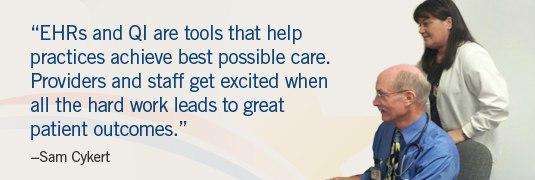North Carolina REC Leverages Meaningful Use for Practice-Based Quality Improvement

The North Carolina Area Health Education Center Program ![]() (NC AHEC), which serves as a Regional Extension Center (REC), supports primary care providers and other health practitioners in adopting electronic health records and using them effectively to improve quality of care.
(NC AHEC), which serves as a Regional Extension Center (REC), supports primary care providers and other health practitioners in adopting electronic health records and using them effectively to improve quality of care.
Building Blocks for Quality
In partnership with other stakeholders, the NC AHEC developed a model for improving care in primary care practices by providing hands-on, ground level, quality improvement consulting and support in primary care practices throughout the state. With funding from the Robert Wood Johnson Foundation, North Carolina piloted the Improving Performance In Practice (IPIP) project, which trained Quality Improvement Coaches (QIC) to work within practices to help measure accepted indicators of chronic care, identify possible changes in practice work patterns to optimize care, and rapidly test and fine tune changes to keep improving care. IPIP demonstrated that real time electronic tools, whether disease registries or electronic health records, that provide reminders and track important elements of care, improved outcome measures. However, access to data isn’t enough; the program demonstrated that the presence of a QIC was essential in helping the practice use the data, build a team approach, maximize work flow, and apply rapid cycle quality improvement techniques to the organization and execution of care.
Establishing a System for Hands-on Practice Support
North Carolina used the IPIP program as a model to develop its REC. There are nine regional Area Health Education Centers (AHECs) that serve as RECs and each one is supported by an REC team with one or more of the following personnel:
• Practice Support Coordinator (supports EHR selection and EHR implementation);
• Technical Assistance Specialist (product expert); and
• Quality Improvement Coach.
A Closer Look at Success: Three Practices Leverage Meaningful Use Stage 1 to Improve the Quality of Diabetic Care
Roanoke Chowan Community Health Center (RCCHC) uses their EHR to generate point of care reminders during clinic visits and population lists of patients whose A1c values either were not obtained in a timely manner or were out of control. RCCHC encourages those on the EHR patient lists to come to the practice, where they receive more focused care. RCCHC also implemented a clinical decision support rule, a core measure of Meaningful Use, by creating a standard process for nurses to manage treatment between visits. As a result, RCCHC successfully decreased the percentage of diabetic patients with A1c > 9 from 40% to less than 10%.
The REC Practice Support Coordinator helped a provider of the Western North Carolina Hypertension Center conduct an analysis to determine what changes the practice could make to prepare for Meaningful Use. She provided education about Meaningful Use measures and in line with Core Measure 13 helped implement both new work flows for clinical summaries and summaries of care records for transitions of care using the EHR . The summaries were printed out prior to patients leaving the office and were used as the foundation for teaching and coaching at the close of the visit.
Karen Reese, a Nurse Practitioner, uses the EHR to promote patient-self management skills. She reports, "We ask patients every visit about their blood pressure. Our basic template prompts us to ask about home monitoring if they are tolerating their medicines. We also review how and when to monitor blood pressure…”
Through these efforts, the Center has achieved blood pressure < 140/90 in over 70% of their diabetic patients, established self-management goals through shared decision making in over 70% of diabetic patients, and performed smoking status inquiries in over 90%.
The local Technical Assistance Specialist helped East Asheville Family Healthcare extract chronic illness quality measures from their EHR and translate them to a run chart. These run charts simply graphed the percentage of diabetic patients each month that met control parameters for the most clinically impactful care measures as noted in the outcomes below. As part of workflow redesign, nurses helped identify patients with elevated test levels or who were due for a diabetes follow up visit. Using population management principles, EHR data, evidenced based guidelines in EHR templates, and a commitment to patient management, East Asheville witnessed reductions of Hemoglobin A1c > 9 rates to 5%, LDL cholesterol values of < 100 in 60% of their diabetic patients, A1cs < 7 in over 50%, and blood pressures < 140/90 in 70% of these folks – values that translate to remarkable long term outcomes.
Meaningful Use of Electronic Health Records Saves Lives
The implementation of EHR s and use of features such as clinical decision support and point of care reminders helps practices improve both the quality of care delivered and the health of their patients. Considering the significant improvements in health outcomes in the diabetic population noted above, it is possible to estimate that roughly 1,000-2,000 lives will be saved within 10 years in the first wave of practices that have complemented meaningful use with quality improvement approaches.
- Over 500 providers have reached Meaningful Use Stage 1;
- Over 2,500 providers have reached milestone 2 of the Meaningful Use spectrum;
- 275 practices are engaged in quality reporting and quality improvement activities related to chronic disease management; and
- Over 50 practices are fully recognized NCQA patient-centered medical homes.


